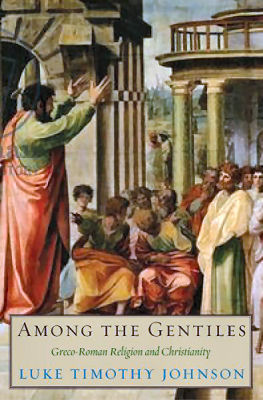
|
Posted July 29, 2009
Book: Among the Gentiles: Greco-Roman Religion and Christianity Author: Luke Timothy Johnson Yale University Press. New Haven, Connecticut. 2009. Pp. 403 An Excerpt from the Jacket:
In undertaking this fresh inquiry into early Christianity and Greco-Roman paganism, Luke Timothy Johnson begins with a broad definition of religion as a way of life organized around convictions and experiences concerning ultimate power. In the tradition of William James’s Variety of Religious Experience, he identifies four distinct ways of being religious: religion as participation in benefits, as moral transformation, as transcending the world, and as stabilizing the world. Using these criteria as the basis for his exploration of Christianity and paganism, Johnson finds multiple points of similarity in religious sensibility. Christianity’s failure to adequately come to grips with its first pagan neighbors, Johnson asserts, inhibits any effort to engage positively with adherents of various world religions. This thoughtful and passionate study should help break down the walls between Christianity and other religious traditions. An Excerpt from the Book: A Final Word I have studiously avoided theological discourse in this study, precisely because I am convinced that, in the case of careful comparative analysis, the field of religious studies provides a more neutral and ultimately more useful form of discourse. My approach throughout has been descriptive rather than prescriptive. But two modest theological implications for Christians do follow naturally from the analysis I have undertaken. The first concerns internal Christian ecumenism. This study suggests that the deepest divisions among Christians may not be those definable in terms of theology or polity but may be those defined by distinct ways of being religious. My analysis further suggests that there is no primitive, pristine form of Christianity that does not bear a strong resemblance to Greco-Roman religion, and that, further, the four “ways of being Christian” in the contemporary world all have some claim to legitimacy within the tradition both of Judaism and earliest Christianity. The challenge to Christians today is to embrace a catholicity of religious sensibility and expression rather than to divide on the basis of mutual suspicion of ways of being Christian that seem strange. The second theological implication concerns Christian relations to other world religions. My analysis has shown that the age-old tradition of Christian polemic against paganism, which relegates to the realm of the demonic the religious practices of one’s neighbors (distant or near, it does not matter), serves to obscure the true state of affairs both within Christianity and in other religions. In Christianity, the ways of being Christian through the ages and today are basically the same as those found in the first “world religion” engaged by Christians, the paganism of the Roman Empire. Christians are more like them than they have ever been willing to admit. In other religions, the sensibilities displayed in Greco-Roman religion, in Judaism, and in Christianity, in all likelihood correspond to those found in other world religions. They are more like Christians than Christians have ever been willing to see. Once Christians are willing to grant the element of continuity — at the level of human perception and experience — the better able Christians are to assess the ways in which they truly are different and must agree to remain different. This, it seems to me, is at least a better starting point for conversation among the religious people of the world than the one that begins in mutual ignorance and suspicion. Table of Contents: 1. Beyond attack and apology: a new look at an old debate 2. Beginning a new conversation 3. A preliminary profile of Greco-Roman religion 4. Religion as participation in divine benefits: Aelius Aristides 5. Religion as moral transformation: Epictetus 6. Religion as transcending the world: Poimandres 7. Religion as stabilizing the world: Plutarch 8. Ways of being Jewish in the Greco-Roman world 9. The appearance of Christianity in the Greco-Roman world 10. New Testament Christianity as participation in divine benefits 11. New Testament Christianity as moral transformation 12. Christianity in the second and third centuries: participation in divine benefits 13. Moral transformation in second-and-third-century Christianity 14. Transcending the world in second-and third-century Christianity 15. Stabilizing the world in second-and third-century Christianity 16. After Constantine: Christianity as imperial religion |
|
